An unshakeable ‘why’
Thoughts while waiting for my husband to finish another ridiculous 100-miler
“How long do you think you’ll keep doing this?” I asked, somewhat sheepishly, as Beat and I rolled away from Boulder on Thursday morning. The Subaru was piled high with waterproof drop bags, a cooler full of cold drinks, more clothing changes than Beat could wear in a week, and more snacks than he could consume in a month.
“I don’t know,” Beat replied impatiently. “I mean, look at Chuck!”
Chuck was already “old” when he introduced Beat to ultrarunning 20 years ago. At 75 years old, Chuck is still winning age-group awards in California ultras. Chuck has some 271 races on his UltraSignup page. Beat has just 180, although that list is missing quite a few finishes — all of his Iditarods, for example, and the Petite Trotte à Léon. Still, he has a long way to go — and presumably at least 20 more years — to catch up with Chuck.
“How long do you think you’ll keep doing this?” I mumbled again, mostly to myself, as Beat slumped into the Ironton aid station on Friday afternoon. He had traveled 27 miles with nearly 11,000 feet of climbing in just over eight hours. It would be a respectable time for a trail marathon of this caliber, and this was just the first quarter of the entirely ridiculous Ouray 100. Still, Beat looked downtrodden and told me he’d felt like shit for most of the first 20 miles.
“I was going to quit here but then my stomach started to feel a little bit better,” he said, which I recognized as a variation of something Beat says at the beginning of nearly all of his races. Beat always feels like shit and has a nagging issue to bog him down in the early miles of a race. This year, his complaint was the remnants of a stomach bug that had laid him low a week earlier. Fair complaint. Still, I know Beat too well. He’s not a quitter, he’s a finisher. He runs his races in the inverse of most people, spending all of his suffering in the first part of the race so he can fly free in the final miles. Thirteen years ago, a friend of Beat’s dubbed his finishing style “The Jesus Fire” and we still use this phrase. Even in his hardest events, Beat sprints through the final miles as though he is divinely inspired.
So I will admit to feeling annoyed as Beat moaned through his routine at Ironton. Why come all of this way if he’s going to quit here? (I knew he wouldn’t quit here, and yet he had been talking about quitting here since he came down with his illness a week earlier.) Why should I cut my hike short just to give him an easy out that he was never going to take?
I had spent the morning marching up a gorgeous trail to a ridge aptly named The Bridge of Heaven. Using Beat’s splits from his past three Ouray 100s, I knew almost precisely when he’d arrive at Ironton and timed my hike accordingly. I walked as far as I could out the Horsethief Trail, dreaming of possessing the freedom to continue to Bear Creek and wrap up an aesthetic 20-mile loop rather than this “as far as I can go” out and back. Dark clouds gathered and I thought, “I should turn around.” But no, I still had a little time. Then I ran out of time and turned around. Ten minutes later, a silent white flash lit up the thin stands of alpine spruce around me. A terrifying boom followed a second later, and I thought, “I should have turned around earlier.”
I ran as fast as I could down the steep, loose trail into Ouray, snaking through shivering aspen trees as rain and hail pelted the talus. Despite running the descent, I only had enough time to change out of my soaking clothes and arrived at Ironton just minutes ahead of Beat.
When you’re crewing a loved one at a two-day race, there’s never enough time.
As Beat sat in a rain-soaked camp chair, I collected a single pierogi and a teaspoon-sized dollop of instant mashed potatoes to force feed into his roiling stomach. Beat took baby-sized bites, finishing only half of his food as he explained his stomach virus to fellow runners and aired out the wrinkled white skin on the pads of his feet. The air smelled of burnt bacon and sour body odor. This smell is so unique and so familiar that I have to resort to distractions such as humming to myself to prevent a creeping queasiness.
To be fair, Beat did not ask me to crew him in this Ouray 100. I volunteered. I’ll deliver my husband’s much-needed cold drinks and monitor his movements if it means he’ll have a better chance of surviving each trip over this race’s fourteen ridiculous climbs. Also, I can’t say no to a weekend in Ouray. The race is objectively fun, with a gorgeous course climbing every beautiful summit this side of Red Mountain Pass, a dedicated group of volunteers, and a race director who is not above laughing at himself and not shy about pointing out his participants’ foibles. Charles plans to write a book titled “Talented Runners” that is as sarcastic as it sounds. The Ouray 100 has an old-school vibe with limited hand-holding and no patience for entitlement. Really, it’s my kind of race — if I had even a modicum of mountain running talent, which is genuinely required to make the cutoffs. And also … if I was still into racing.
I suppose this is where my cognitive dissonance begins, and why I feel like I’m being left behind rather than moving forward. Beat has little interest in trading the thrill of finishing a ridiculous race for little adventures, such as climbing a single pass rather than 14 in one go. These little adventures could sustain me, I think, but then wouldn’t I miss the striving, the discovery of untapped power, the spiritual awakenings and awe that comes when the moon rises on a second night of continuous motion?
And yet, what am I seeking when I enter a race? Finishing the Bryce 100 in May was so hard, yet when I remember the experience, I feel a quiet sadness tinged with humiliation. During the Bryce 100, I was a wheezy mess, a prisoner to the oppressive dust, and embarrassed that my breathing difficulties made me feel so fearful and powerless. I hated being the third to last to finish. Later, I was sad that I had attached so much negativity to such a beautiful place. Too many of my efforts in the past five years have left me feeling this way. Why should I work so hard to feel like shit during and after a race? And yet. And yet.
While waiting for Beat, I took a back-straining nap in my Subaru. I read half of a novel on my phone. I ate an entire box of Reeses Puffs cereal as two meals. I burned my fingertips trying to drink coffee from an aluminum cup. I hiked 40 miles with 12,000 feet of climbing. I listened to two more books on Audible. I was caught in three thunderstorms. I filled the cooler with drinks and filled it again. I realized Beat was taking in nearly all of his calories in the form of cold sodas, which made me feel proud that I could be useful. I waited out a downpour under an aid station canopy. I watched a black bear tear apart a dumpster outside my hotel room. I set alarms for 1 a.m. and 5 a.m. I saw friends I don’t often see and laughed with the unrestrained glee that sleep-deprived delirium can induce.
And I marveled at Beat’s “why” as he marched and marched and marched, growing more relaxed and happier as the miles dragged on.
Earlier this year, I saw a social media post about reaching the elusive ultrarunning achievement of “One hundred hundred-milers” and calculated how close Beat was to this number. The person touting the list included races of a hundred miles or more, so I added up all of Beat’s thousand-mile Iditarods, his PTLs, Tor des Geants, and Swiss Peaks. I came up with about 70 finishes — still a fair distance from 100, but reaching it in his lifetime wouldn’t be an impossible goal. I was surprised Beat’s number was so few, and also so much. Beat didn’t think it was fair that each Iditarod could only count once, but such is the standard.
What is an achievement, anyway? It’s such a loaded, subjective question. Why do any of us do any of the things we do? I’ve long accepted that we as individuals do not share the same joys, the same sorrows, the same values, or even the same concept of reality. We're all just walkin' through this darkness on our own. I can accept this. But how do I accept that I no longer understand the motivations of the person I was just a decade ago? How do I reconcile a joy that seems to come effortlessly to Beat?
Beat finished the 2024 Ouray 100 at 6:08 a.m. Sunday for a finishing time of 46 hours, 8 minutes, and 13 seconds. He was 28th overall out of 61 finishers and 123 starters. In that sub-two-day period, he climbed more than 41,000 feet over 102 miles. Through sweltering high-altitude heat and violent hailstorms, he wore the same Diablo shirt that he received for running the 50-miler in 2008 and has adopted as his lucky shirt since his first Ouray 100 in 2018. This was his fourth Ouray 100 finish and 70-something finish of 100 miles or more (I’m going to need to recalculate Beat’s races, as I lost my earlier list.)
I smiled at the notion that these huge things could become so commonplace, so mundane. And also, how damn proud I was of Beat despite the relative mundanity of the moment.
So what’s next? As I was writing this post a mere 60 hours after Beat finished the Ouray 100, he walked in the door after an indulgent dinner with colleagues and announced that he was thinking about signing up for the Creede 100. Creede is another punishing march through the high country of Colorado’s San Juan Mountains, and by the way, it’s July 27 … four days from now.
As long as the struggle continues, the fun never ends.

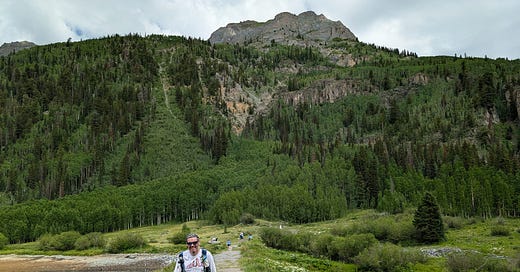



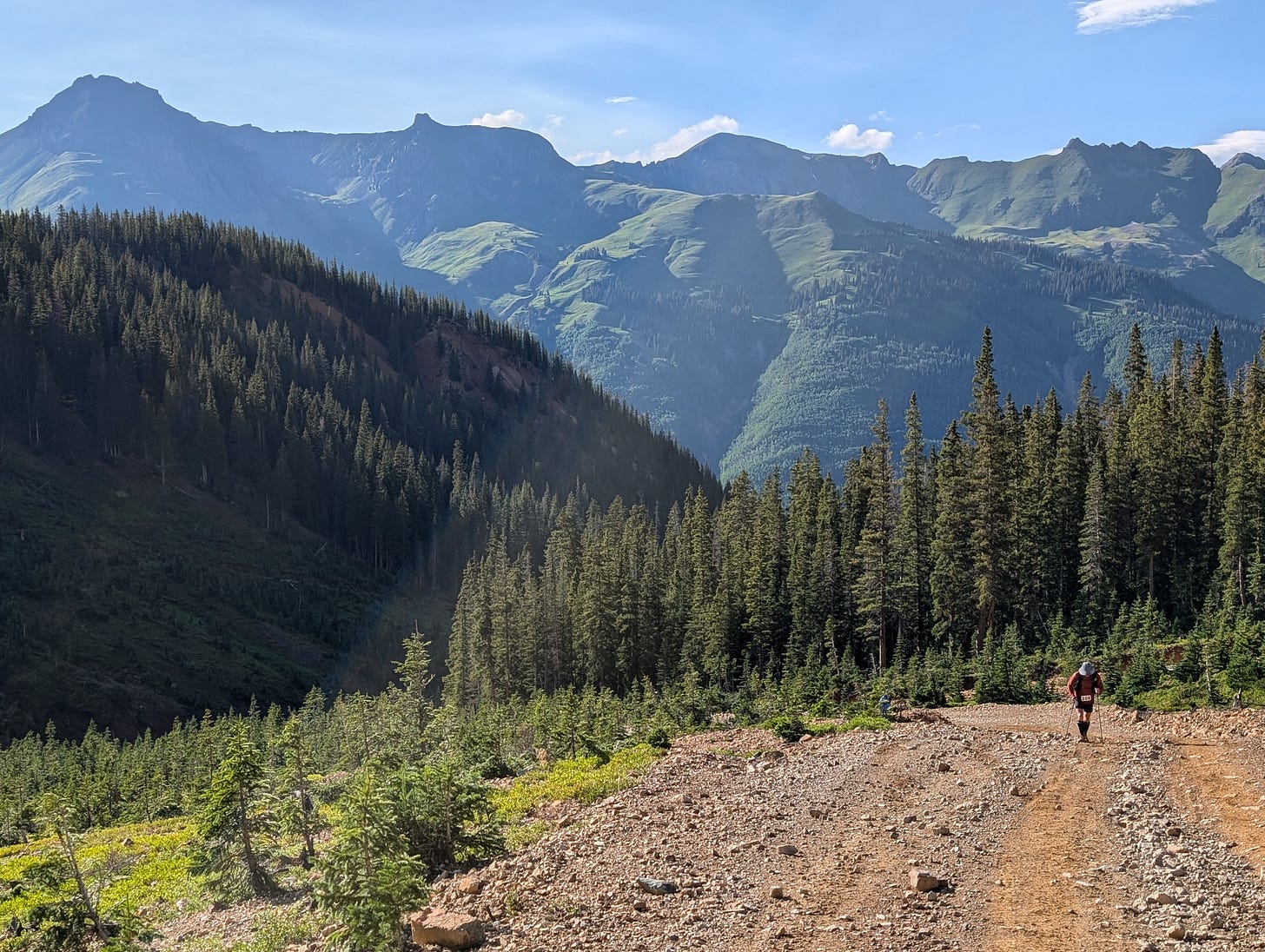
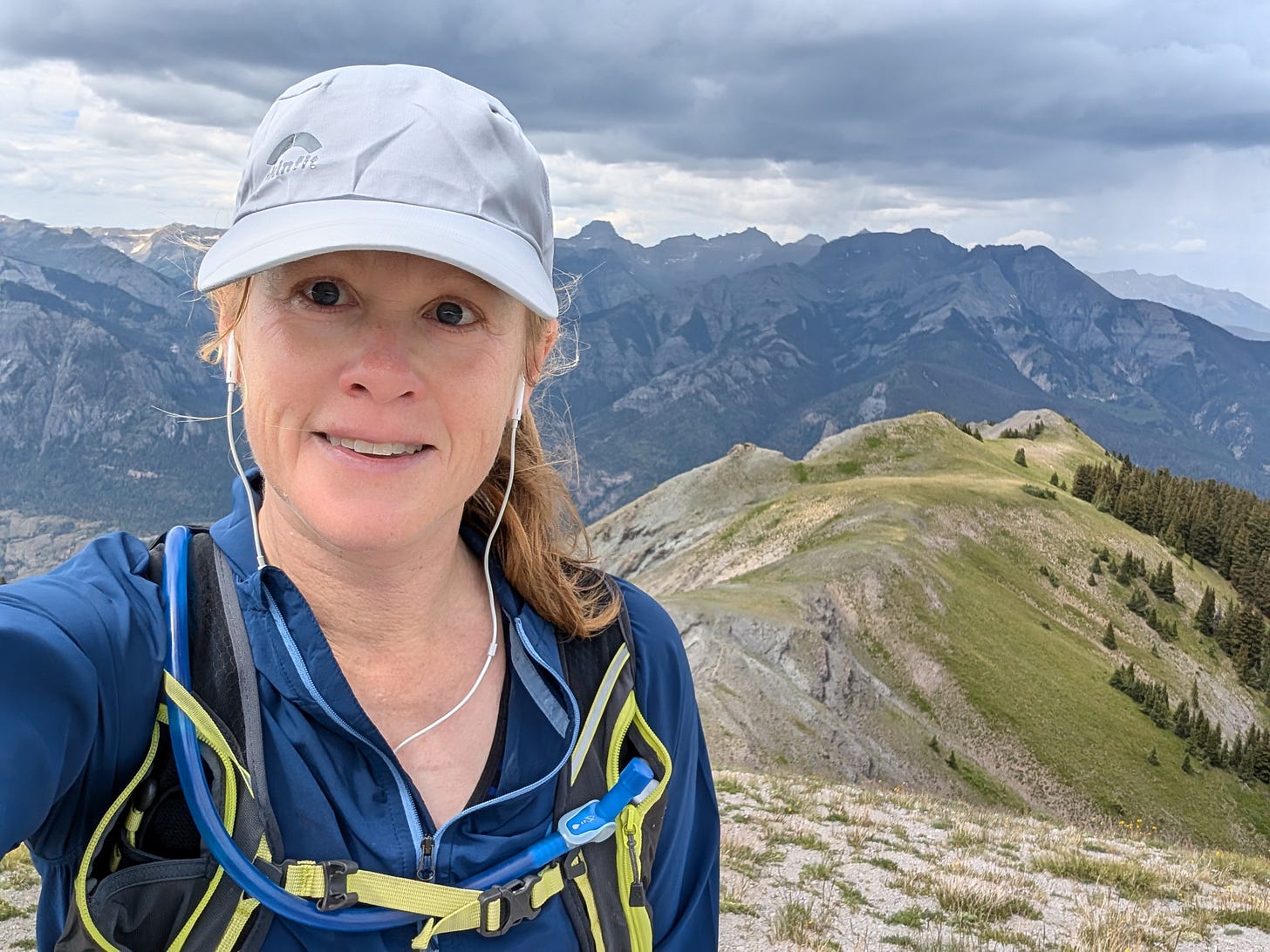
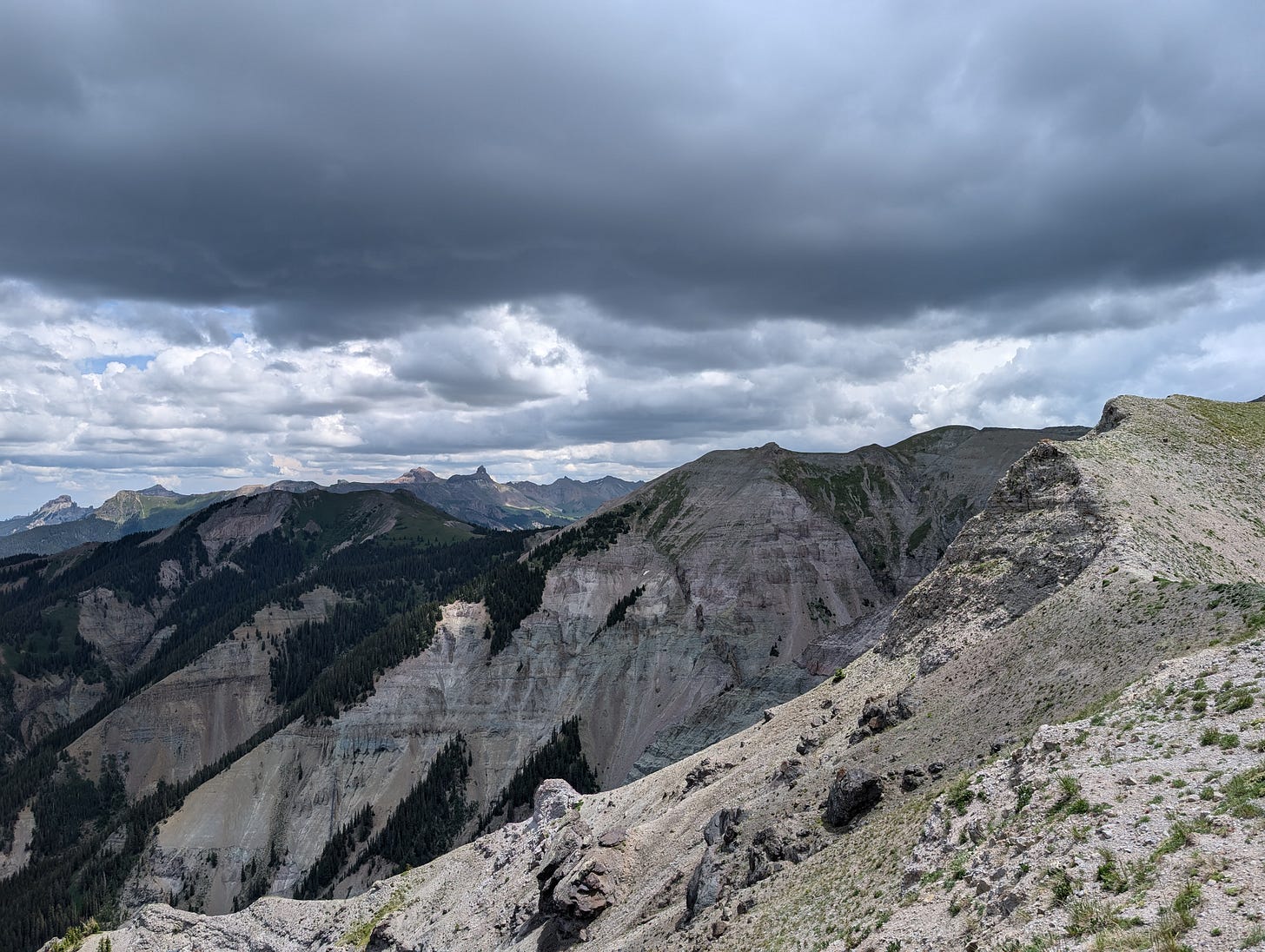
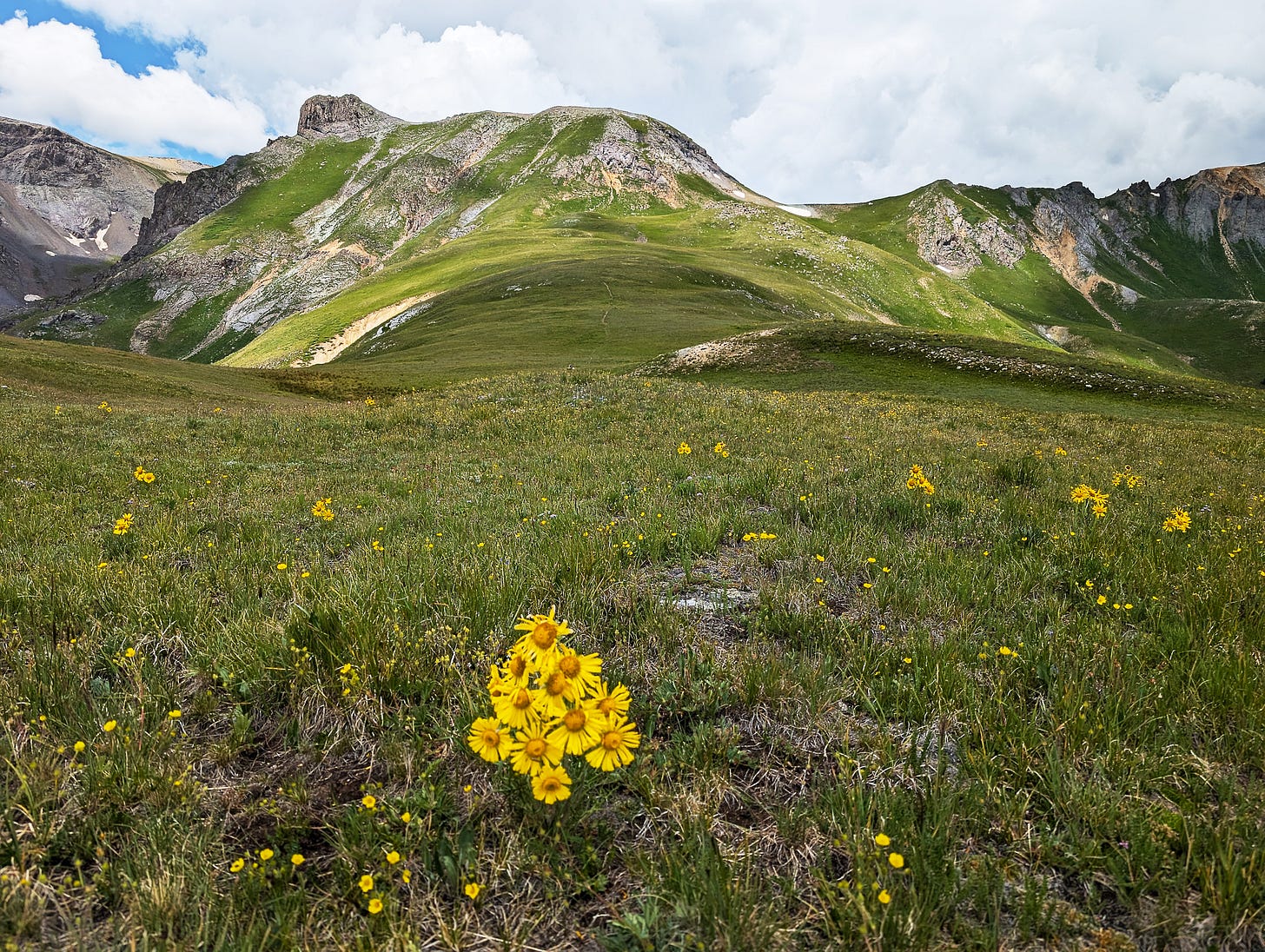
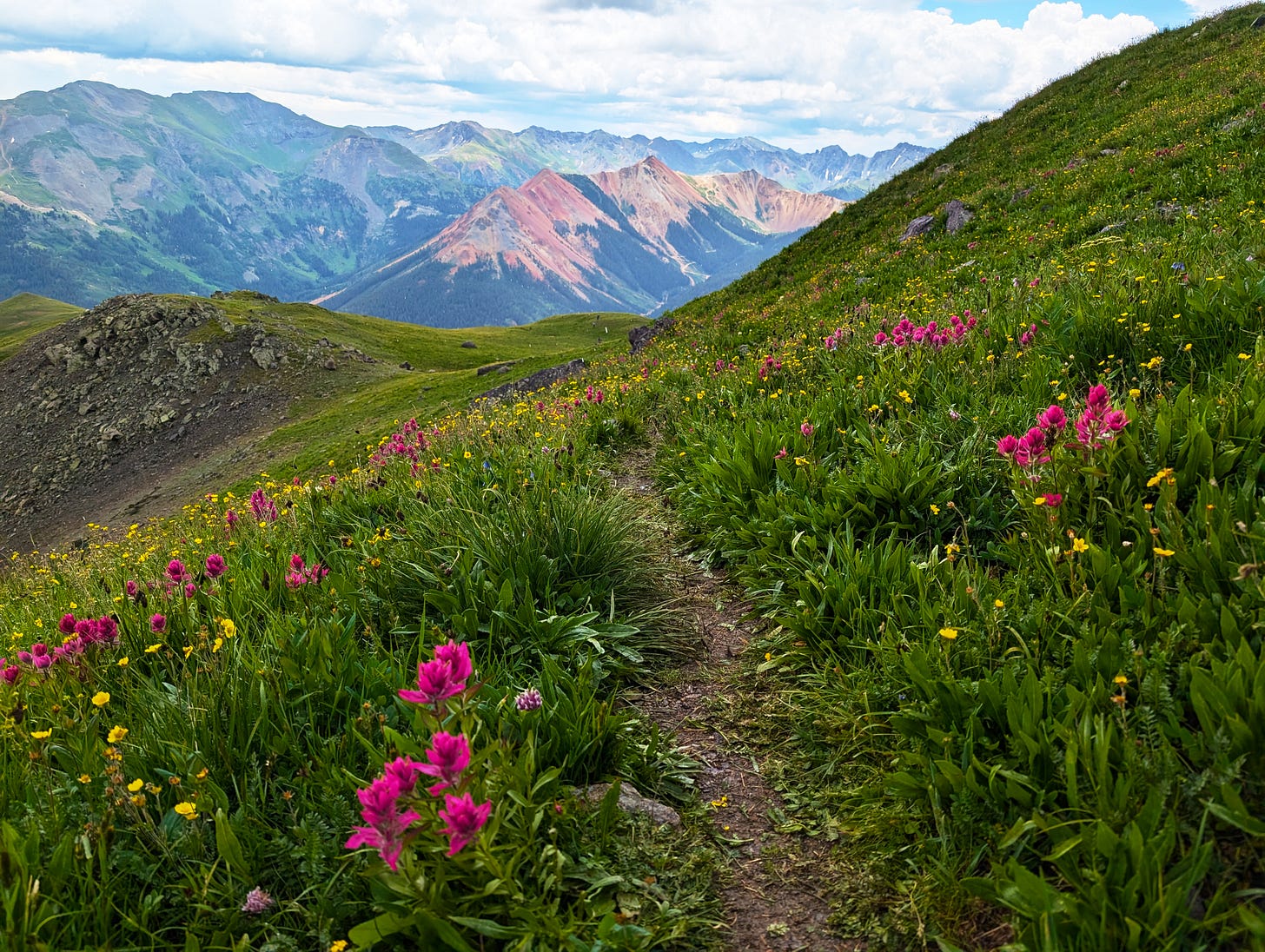
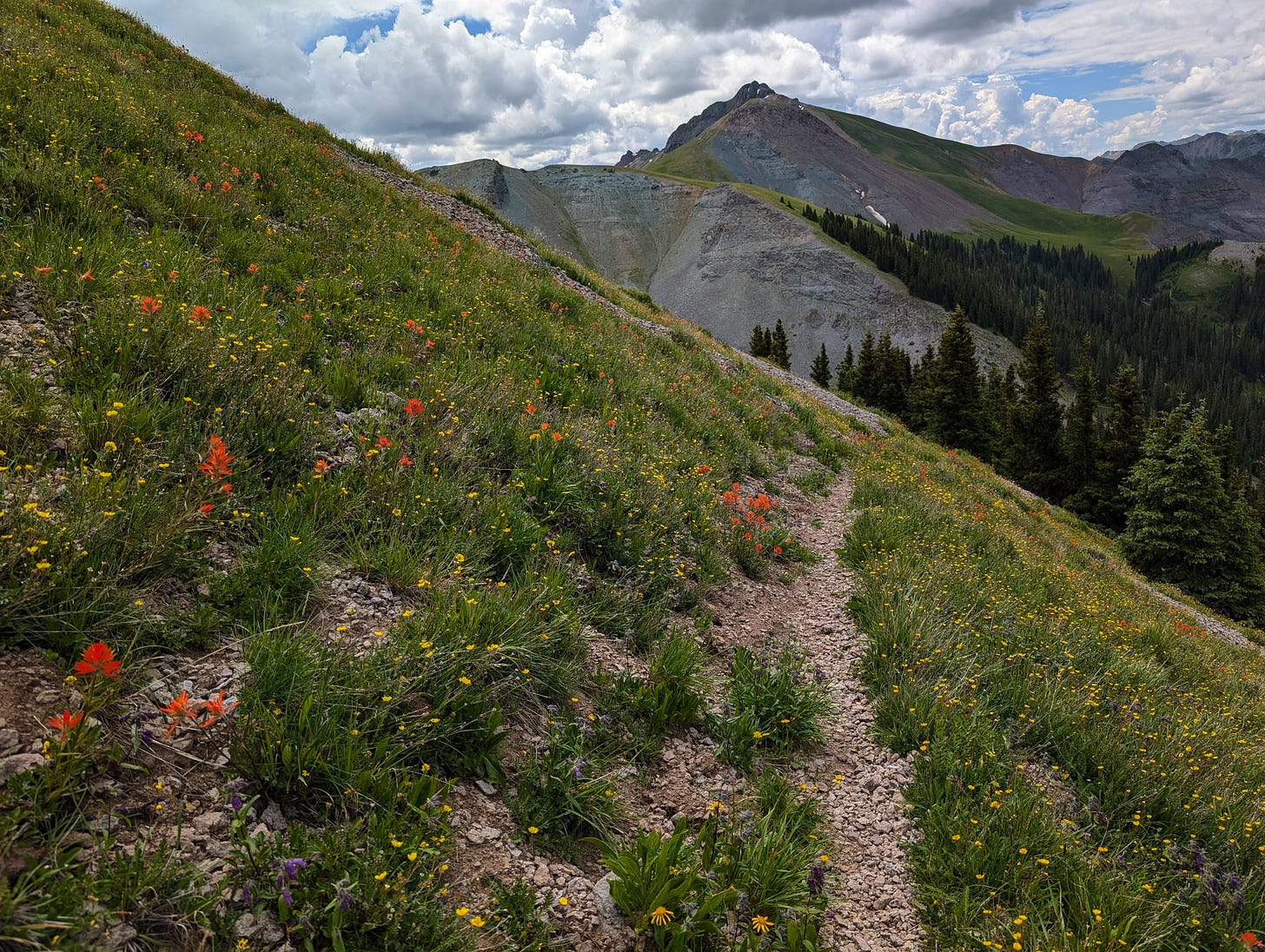
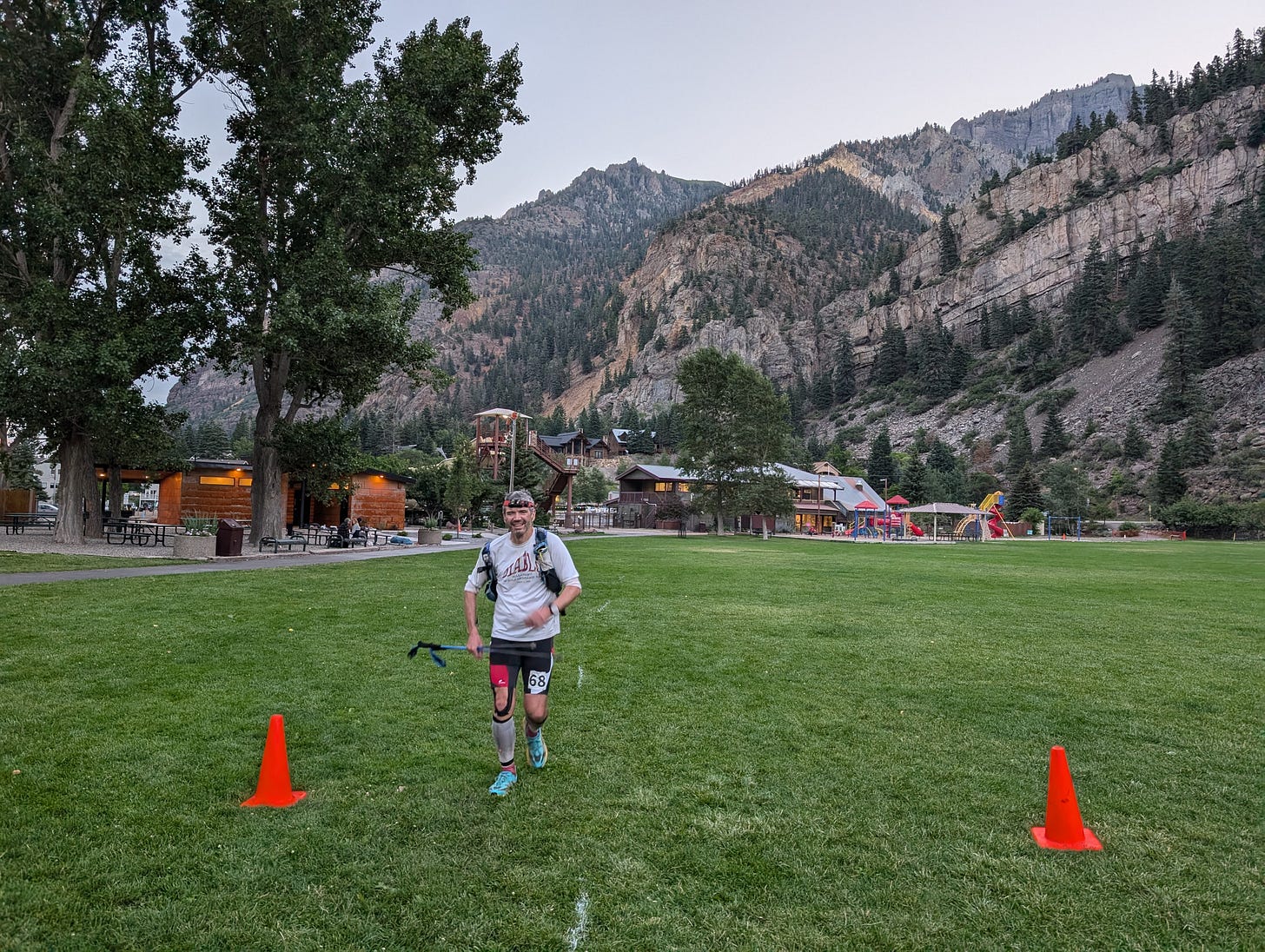
Great stuff, Jill! And congrats to Beat. - J
I feel for you! (But I substitute “knee issue” for breathing issues.) I too “race so I have an excuse to train.” I love the buildup & structure. I think it’d be great to try something new.